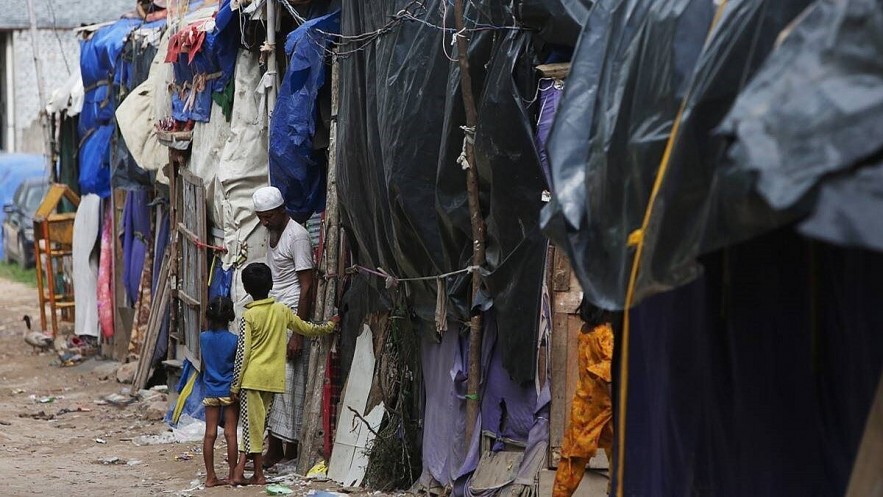 |
| War and political instability have created, chaotic flows of refugees and other migrants, and have been one of the foremost causes of national populism. (Express photo by Gajendra Yadav) |
The world has changed dramatically in the past two years. The two most significant triggers of this change have been the Covid pandemic and the Russian invasion of Ukraine. These two events have disrupted the structures of economic globalisation. National policy responses have been less than ideal, with the largest mistake being the US Federal Reserve’s tardiness in combating rising inflation. Their delayed action is shocking the global system even further. Even before these shocks, there was mounting concern about the effects of globalisation on the livelihoods who were not well equipped to benefit from increased competition and rapid technological innovation. Populist nationalism was rearing its ugly head, even in seemingly liberal democracies like the United States and United Kingdom.
Rana Foroohar, who occupies a prominent and influential position as the global business columnist for the Financial Times of London, offers her perspective on the state of the world in a new book, Homecoming: The Path to Prosperity in a Post-Global World. Her diagnosis is a familiar one, and two quotes capture her perspective well: “far from making us all “free,” the free market changed us from citizens into consumers, increasingly beholden to the increasingly large companies that outsourced our jobs and mined our personal data…” and “two groups prospered disproportionately under American-style neoliberalism: multinational companies and the Chinese.”
In essence, Foroohar’s solution is to enhance and diversify sites of local production.
“Homecoming” in this context means, according to the publisher’s blurb, keeping “operations, investment, and wealth closer to home, wherever that may be.” Economists will recognise familiar ideas underlying this vision, including the dynamics of comparative advantage, learning by doing, agglomeration economies, and so on. Perhaps the new component in current formulations is the concept of “resilience, given salience by the Covid pandemic and its impacts. In addition, information technology provides new tools for this re-localisation, just as it aided globalisation over recent decades.
Foroohar’s thesis and prescriptions are somewhat reminiscent of Raghuram Rajan’s ideas in his 2018 book, The Third Pillar—How Markets and the State Leave the Community Behind. There, Rajan noted the rapid progress of economic globalisation, spurred by trade and technological change, and how national governments had scaled up accordingly, leaving communities behind. Rajan’s communities are a localised version of the general concept of civil society, and he emphasised the value of social ties and social capital. In that sense, his ideas complement those of Foroohor, who argues that geographic specialisation has gone too far, exceeding what is optimal, though she mixes this with value judgements about consumption. Implicitly, her case is also that robust local economies are a necessary for civil society to thrive.
There is much to be commended in analyses that question the extent and pattern of economic globalisation. What is striking is that both books have a primarily developed country perspective.
They recognise the growth of inequality within developed countries—something that is being repeated in developing countries as well – but not the reduction of inequality across countries. “The Chinese” who have benefited disproportionately were much poorer three decades ago than they are now, on average. They have caught up with their American counterparts and rivals, and this is not a bad thing for the world as a whole. The unequal distribution of wealth and income in each country should concern policymakers in each—they have clearly not done a good job of serving many of their citizens well. But the average Chinese is now four times as well off as the average Indian. Judicious engagement with the global economy and pursuit of the benefits of international trade and international finance are still what India needs to raise its’ citizen’s standard of living.
Interestingly, the area of globalisation that has been the most problematic is the international movement of people. War and political instability have created, chaotic flows of refugees and other migrants, and have been one of the foremost causes of national populism. Rajan and Foroohar both are champions of immigration and the movement of people, both within and across national boundaries. But such movements will always cause some tension, and there is no general answer to how to balance the movements of people, products, raw materials and financial capital. Nor is it clear how local governments and communities are supposed to deal with adjustment costs and the provision of public goods, such as local infrastructure and education, in the world of re-localisation. Finally, if the world is to survive at all, it has to deal with carbon emissions very quickly in the next two or three decades. This will require a major restructuring of the global economy, one which will require national policies and international cooperation and coordination. Technological change will matter more than ever to achieve this transition.
India has to embrace globalisation with these goals in mind. It has to globalise on its own terms, and equip its citizens to participate as fully as possible in the new economy. Strong local communities and local economic clusters are a good thing, but they are no substitute for global thinking and global action.
Vietnamese Leave Ukraine: Lose All, Refugees in Strange, Hope to Return Second Homeland
After about 9 months being refugees from Ukraine due to Russian-Ukrainian war, many Vietnamese have gradually been used to new life despite many difficulties and challenges. Facing the new year of 2023 and Lunar New Year, they always hope the political situation will be soon stablized to possibly return to their previous life.








